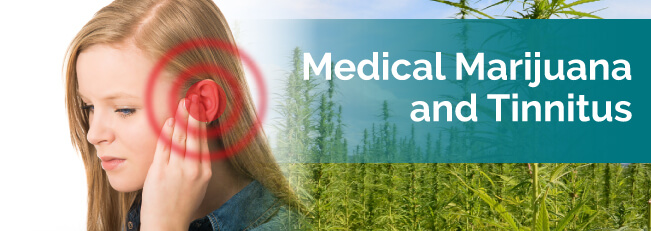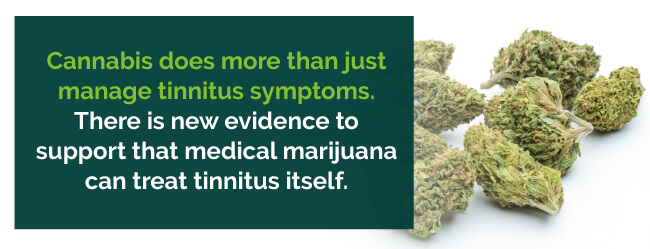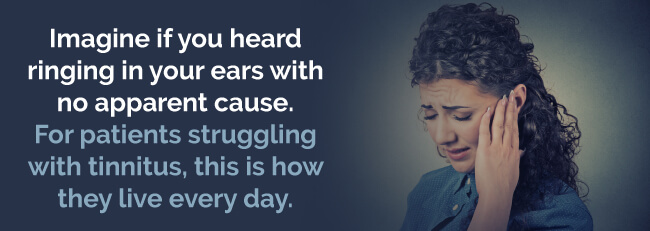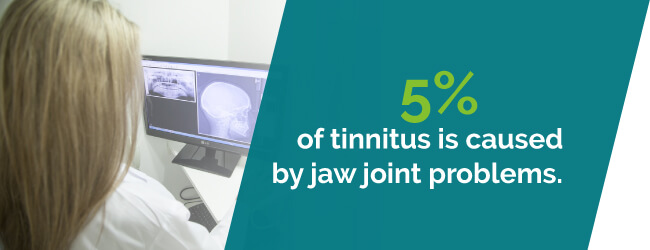
If you struggle with tinnitus, you have probably exhausted many avenues of treatment. This disorder may seem like a slight annoyance for some. For others, it affects how they interact with the world.
The medical marijuana field is in its infancy, and we are only just discovering the many applications this herb has in the realm of health and healing. However, cannabis treats many of the underlying conditions that cause tinnitus. It also can help with health complications resulting from the disorder. Read more to explore how medical marijuana could be an effective treatment for your tinnitus.
Medical marijuana is a multifaceted drug. Research supports the use of this all-natural medication for many symptoms and conditions.
Tinnitus co-occurs with different disorders, and medical marijuana has the potential to help some of them — this means relief from both tinnitus and the condition that causes it.
An example of this is Post Traumatic Stress Disorder (PTSD). Soldiers serving in dangerous locations are often involved in firefights and other experiences involving explosions. They return from serving with tinnitus and loss of hearing from the loud explosions. They also develop PTSD. Medical marijuana treats both the PTSD and the tinnitus.
Find A Doctor Find A Dispensary
Cannabis is also an effective treatment for the symptoms associated with the disorder. Both anecdotal accounts and designated research studies have shown that cannabis medications provide effective relief for insomnia. It’s also known for relieving stress and providing relief to those struggling with anxiety or depression.
However, cannabis does more than just manage tinnitus symptoms. There is new evidence to support that medical marijuana can treat tinnitus itself.

Tinnitus is caused by a disruption in the auditory system, meaning that there is a disconnect between the ears and how the brain perceives the auditory signals being sent. Dr. Thanos Tzounopoulos, an assistant professor at the University of Pittsburgh and a member of their auditory research group, has been delving more into tinnitus research for the last decade. He found that the brain can “learn” to be more sensitive to certain stimuli, also called plasticity.
Plasticity in the brain can be controlled by the endocannabinoid system, the receptors that act as a bridge between the body and the mind. This system is highly sensitive to medical marijuana therapies. Much like chronic pain, the plasticity caused by tinnitus has shown improvement with the use of cannabis.
Unfortunately, Tzounopoulos’ research does not reveal the exact reason why medical marijuana brings relief to tinnitus patients. Further research is required, and he is still working to expand his knowledge in this field. However, the results should bring hope to patients struggling with the condition.
Researchers are still developing medical marijuana treatments for tinnitus. However, the complications that often accompany it can be helped with cannabis. These symptoms include:
Because of the recurring and aggravating sounds produced by tinnitus, many people who have this condition complain of problems sleeping and insomnia.
Cannabis has long been used as a sleep aid. Only recently, though, has the scientific world discovered how marijuana helps people sleep. Indica strains of cannabis have a higher concentration of cannabidiol (CBD). CBD is a compound found in marijuana that increases sleepiness and relaxation.
Irritability and stress are the most common side effects of tinnitus. If tinnitus remains untreated, anxiety can easily develop, which only makes the tinnitus worse. It’s important to de-stress and get yourself into a good frame of mind.
CBD is the compound in marijuana that best treats anxiety. Be sure to avoid tetrahydrocannabinol (THC), as it may add to anxiousness.
When the cause of your tinnitus remains unknown, and the condition persists, a sense of hopelessness can develop. But it’s important to maintain a positive outlook, as this will aid the healing process.
Four hundred years ago, cannabis was used as a treatment for depression in India. Today there is a debate as to whether medical marijuana can lessen feelings of depression.
More research still needs to happen. However, initial studies show that the chemical makeup that determines cognition, emotions and behavior are similar to the chemical makeup of cannabis. Using medical marijuana can restore chemical balance to the body and ease feelings of depression. The terpene limonene has been shown to elevate a user’s mood.
The cannabis produced and sold in dispensaries today is tailor-made to treat specific symptoms. Many of these strains could be used to treat the symptoms associated with tinnitus. Each has a different therapeutic effect, so it’s important to do your research to find the best strain for you. If you need additional help, be sure to speak to a marijuana doctor or a bud tender at a local dispensary. Various conditions and their associated strains include:

There are many ingestion methods you can use to benefit from medical marijuana. This ranges from edibles and tinctures that you place under your tongue, to water pipes and other vaporization methods.
However, it is highly recommended that patients struggling with tinnitus not smoke. Smoking narrows your blood vessels. Your ears and other sensory cells will not get the oxygen they need, worsening the ringing sensation. Avoid prerolls and other smokable marijuana.
States across the U.S. have approved medical marijuana for many medical disorders. Although tinnitus won’t appear on the lists of qualifying conditions, insomnia and anxiety are listed by some states. It’s important to determine your state’s qualifications for medical marijuana use. Then make an appointment with a marijuana doctor. This is the first step to getting your medical marijuana card and improved quality of life.
Find A Doctor Find A Dispensary
Imagine if you heard ringing in your ears with no apparent cause. For patients struggling with tinnitus, this is how they live every day. This condition can be temporary, or it could last your entire life.

Tinnitus is not a disease. It is a symptom of an underlying condition. Although it can be intermittent and the sound can vary in volume, it persists and does not go away. It’s most evident when background noise is low, like when patients attempt to go to sleep.
In most cases, only the patient can hear the noise, also known as subjective tinnitus. Some tinnitus is audible to the physician if they use a stethoscope, and it’s called objective tinnitus. Rare cases of this disorder synch up with the patient’s heartbeat. This is known as pulsatile tinnitus.
Most people with the condition view it as just a slight annoyance, but it can severely impact a person’s quality of life, changing the way they perceive the world.
The medical world is unsure of the mechanism that causes tinnitus, but they do know that it’s a symptom of some malfunction in the hearing system. It stems from an underlying condition. Many tinnitus sufferers have had prolonged exposure to loud sounds. This includes those whose profession involves a noisy atmosphere, such as pilots, rock musicians, soldiers, etc.
Conditions that have been shown to cause tinnitus include:
In some cases, the ringing stops once the underlying condition is treated. Frequently, even after treatment, the unwanted sounds continue. At this point, physicians look beyond the ear to the brain.
The auditory circuits in the brains of those with tinnitus are more excitable. This could be due to either hyperactivity in neural pathways, reduced activity or a combination of both.
Ringing in the ears is a common symptom that has been recorded for millennia. The term comes from the Latin word tinnire, which means ringing. The first written account of treating tinnitus occurred in Ancient Egypt. Infused oil, frankincense, tree sap, herbs and soil were administered to a patient with a reed stalk in the outer ear.
Most treatments through the ages involved inserting herbs, oils and even hot bread directly into the ear. During the middle ages, hot candles were placed in the ears to draw out wax and other debris. Candling is an alternative medicine still used today to treat tinnitus and other ear maladies.
During the Renaissance, surgical treatments became popular. They believed that tinnitus was caused by wind trapped in the ear. They created a surgical puncture in the mastoid, the cavity located directly behind the ear.
The French physician, Jean Marie Gaspard Itard worked with tinnitus patients during the 18th century. He was the first to recognize that if a treatment failed, the doctor’s duty was to make the condition more bearable.
The 20th century saw the inception of tinnitus caused by over-the-counter medications. Aspirin or aspirin-containing compounds have been shown to cause or make this condition worse. Other common medications, like anti-inflammatory drugs and diuretics, list tinnitus among their possible side effects.
More recently, it was proven that tinnitus was more than just an auditory problem. It was also related to brain function. This was established when individuals who could not hear at all, even those who had their auditory nerve cut, developed tinnitus.
Some of the common symptoms and side effects of tinnitus include:
Although many associate ringing in the ears with hearing loss, tinnitus does not cause this.
Since tinnitus is a symptom of an underlying condition, it’s not simple to diagnose or treat. It’s important to go to your doctor or audiologist to determine what is causing it. If it’s an infection or blockage, it can be easily treated by a medical professional.
If the condition persists after treatment, then other therapies must be attempted, both conventional and unconventional. These treatments are used to either decrease or cover up the aggravating sounds.
Any treatment attempted needs to address the underlying conditions of the disorder. These conditions may not have been caused by an auditory problem or ear malady — it may be a neurological disorder.
Some common treatments recommended by physicians and audiologists include the following:

Certain things have been shown to make tinnitus worse. It’s recommended that patients try to avoid the following: